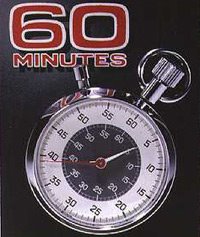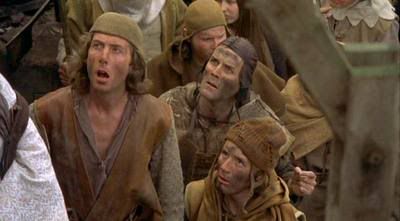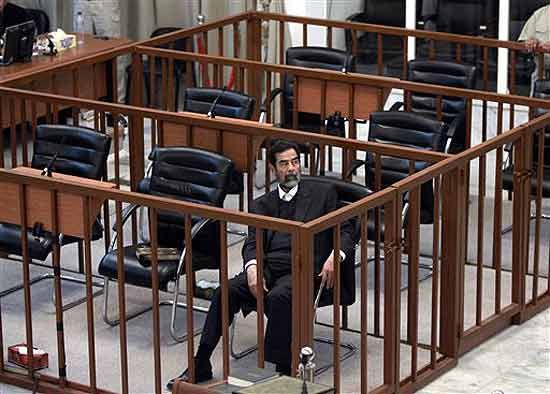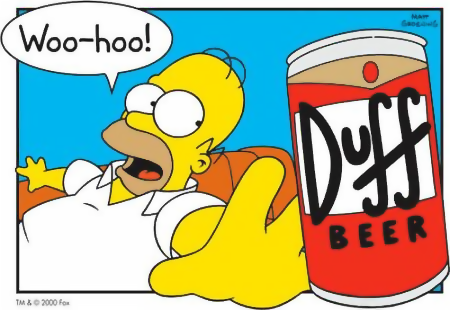
The tease was tantalizing. For hours last evening, I fought the siren call of my pillow to intermittently check the home page of the
Drudge Report, in the hope that, finally, hard news would replace the siren call of
"Further details emerge on rape accusations against members of Duke lacrosse ... Developing" emblazoning its header. And then, there
it was! Link to a hot, steaming pile of dreck for which, according to its byline, one
Duff Wilson claims primary responsibility.
Irresponsibility:While the headline of this disgraceful piece of "investigative journalism" proclaims that
Files From Duke Rape Case Give Details but No Answers, Duff exhausts the equivalent of seventeen pages excreted from my desk top printer fashioning an answer to, indeed, a
justifcation of, D.A. Michael B. Nifong's election to proceed with what "[d]efense lawyers...Duke alumni and a group of bloggers" would color the "flimsiest" of rape allegations.
Incredibly, however, Duff props up his transparently desired conclusion -- "that while there are big weaknesses in Mr. Nifong’s case, there is also a body of evidence to support his decision to take the matter to a jury" -- with slipshod allusion to what he deems "[c]rucial to that portrait of the case": "Sergeant Gottlieb’s 33 pages of typed notes and 3 pages of handwritten notes."
Worse, instead of doing what an investigative reporter, I thought, was supposed to do when presented with highly suspect material passed off as fact (read: "Sergeant Gottlieb’s 33 pages of typed notes and 3 pages of handwritten notes") -- ask tough questions of the generator of the source material, seek alternative sources of information when stonewalled by the generator or judicial tyranny, dig relentlessly to unearth honest answers to important questions swirling about the the veracity, reliablity and trustworthiness of the suspect material -- Duff blindly
accepts Gottlieb's fiction as the linchpin upon which to hang the most despicable example, to date, of the mainstream media's obstruction of justice for the three young men maliciously accused of the most heinous of crimes: racially-motivated gang rape.
While "Justice" Titus' unconstitutional gag order might be offered by Duff to rationalize his having avoided direct contact with Gottlieb, it certainly did not preclude his ability to consider the type of questioning Gottlieb will, no doubt, be subject to on cross-examination at any trial of this matter before deciding to assert Gottlieb's creations as "evidence stronger than that highlighted by the defense."
***
Questions like these:
Q: You've been a member of the Durham Police Department for [nearly] twenty years, correct?
Q: Before being offered, and accepting, that job, you were required to attend police academy instruction and training, correct?
Q: In fact, you had to be certified as having successfully completed such training before starting your employment with the DPD, right?
Q: In other words, you could not be hired as a Durham police officer until having passed that professional course of training, correct?
Q: That professional training included instruction in the appropriate and acceptable ways of interviewing witnesses, no?
Q: And, "witnesses" includes crime victims, suspects, and third parties with information relevant to assist in your investigation of a crime, doesn't it?
Q: And you passed that training, of course, didn't you?
Q: You were also trained in the manner in which to make and keep notes of witness interviews, correct?
Q: Passed that training, too, right?
Q: And that training instructed that you, whenever possible, make your notes contemporaneously, that is, at the same time as, your conversations with witnesses, isn't that so?
Q: In fact, writing down witness statements at the very time the statements are made is the favored practice, is it not?
Q: An officer who writes a witness statement into his notes at the time the statement is being made is an officer using good and accepted practice, isn't that true?
Q: Well, an officer writing his notes of a statement at the time the statement is made is not doing anything wrong, is he?
Q: He's not going to be reprimanded for that, is he?
Q: Because, if you're writing down a witness statement at the time the statement is made, you are following the favored practice taught to you all the way back in the police academy, correct?
Q: I'm sure you strive, every day, to perform your job according to the proper procedures you were taught all the way back in the police academy, don't you?
Q: Because you want to do things right, right?
Q: Because you're a good officer?
Q: Your training also taught you that you should take great care to write down witness statements in your notes as accurately and completely as possible, correct?
Q: You've been trained to record the witness' statements in writing as the witness is speaking, correct?
Q And to ask the witness to repeat or clarify a particular statement that you want to memorialize perfectly in your notes, right?
Q: You were trained, in fact, to use quotation marks to connote written notes that record exactly what a witness said, were you not?
Q: And that is your own custom and practice, isn't it?
Q: So, if a witness interview note written by you includes matter framed by quotation marks, you are indicating by the quotation marks that that is exactly what the witness said, fair?
Q: If it's in quotation marks, it's not your own summary or impression of what was said, it is what was said, right?
Q: Verbatim?
Q: And it is, of course, your custom and practice to include in your interview notes any and all information that you deem relevant, or important, to on-going investigation, isn't it?
Q: I mean, you'd never not write down information given by a witness that you felt was important to solving the crime, right?
Q: So, you always do write down any and all important information told to you by the witness you're interviewing, correct?
Q: What do I mean? I mean, information that you, in the course of your investigation, and in consideration of your training and experience, feel is important to the case?
Q: You don't "leave out" any important stuff then, agreed?
Q: That's very important to the conduct of a thorough criminal investigation, isn't it?
Q: It's very important to justice-minded criminal investigation, isn't it?
Q: What do I mean? I mean that you know, from your training and experience, that your notes of witness interviews are often used by the District Attorney's office in the prosecution of defendants charged with the crimes you've investigated, isn't that so?
Q: You know, from your training and experience, that you might expect to be called as a witness at a criminal trial to read your investigative notes to a jury, correct?
Q: In fact, you've testified to juries in open court "X" times, haven't you?
Q: And you know, from your training and experience, that your notes of witness interviews are often introduced in open court as evidence in criminal trials, correct?
Q: You know, from your training and experience, that trials of crimes charged often occur long after, sometimes years after, the alleged crime and your investigation of it, don't you?
Q: And, knowing that, you always make sure that your contemporaneous notes of witness interviews are as full and complete and accurate as possible, correct?
Q: To help refresh your own recollection when you are called upon to testify about events long past, correct?
Q: Because your own memory of, say, investigating a purse theft would be sharper and more accurate at the time you spoke to witnesses shortly after the theft occurred than it would be, say, three years after its occurrence, fair?
Q: And you'd agree with me, wouldn't you, that the purpose of a criminal trial is not exclusively to secure a conviction against an accused?
Q: You'd agree with me, wouldn't you, that the dual purpose of a criminal trial is to see that, both, the guilty are convicted and that the not guilty are set free?
Q: In other words, to insure that justice is served?
Q: Which is, in large part, why it is your own custom and practice to make your notes of witness interviews at the time of the interview, or as quickly as is reasonably possible for you to do so, correct?
Q: So that the jury will have a record of witnesses recollections of a particular event at a time shortly after the event occurred, correct?
Q: Because, in your experience, the recollections of witnesses tend to change over time, do they not?
Q: In fact, it has been your experience that witnesses memories of particular events fade with time, hasn't it?
Q: Yes or no: Do you mean by that answer that, in your experience, some witnesses' memories have actually improved over time? Um-hum.
[Seek court permission to have Gottlieb's original 3 pieces of near-illegible scrawl marked for identification]
Q: Now, your job also requires you to make and keep comprehensive reports of all information developed during the course of investigation, does it not?
Q: A typical such report, as opposed to witness interview notes alone, would include all relevant information you have developed pertaining to a particular investigation, fair?
Q: The report might be added to from time to time as an on-going investigation proceeds, correct?
Q: It might also include investigative information developed by other officers working on the case, correct?
Q: It would include information, for example, about the scene of the crime? Personal observations upon canvassing an area? Complaining witness or witnesses? Injuries? Personal property damage? Evidence secured from the scene? Eyewitnesses? Descriptions of suspects? Contact information -- addresses, phone numbers, and the like? Witness interviews? Fair? Anything else?
Q: Good and accepted practice is to type information already secured onto the report as soon as is reasonably possible, correct?
Q: What do I mean? I mean, if you're sitting around the station, having already secured the name and address of a suspect, and fellow officers are out in the field trying to secure the identity of a second suspect, it would be good and accepted practice for you to type the name of the suspect you've already identified onto the report, wouldn't it?
Q: There's nothing in Departmental Regulations or police academy training instructing that you should not enter the information you already possess, is there?
Q: There's nothing in Departmental Regulations or police academy training instructing that you should wait for fellow officers to complete every phase of on-going investigation before you type information you already possess onto the report, is there?
Q: In fact, the favored practice is to type information onto those reports as soon as possible after the information is received, isn't it?
Q: Even if further investigation is on-going, right?
Q: Because if information already received is recorded in a timely manner, there is virtually no possiblity that the information will be accidentally misplaced or lost, right?
Q: Most of this is pretty much just common sense, isn't it, Sergeant?
Q: And it happens, on occasion, that you interview a witness with another officer, doesn't it?
Q: And the other officer contemporaneously makes written notes of the witness' statements, as well, correct?
Q: Because, like you, he or she has attended and passed police academy training, correct?
Q: Because, like you, that other officer has learned the DPD's accepted, proper procedures, correct?
Q: Because, like you, he strives every day to do his job correctly?
Q: Because, like you, he strives every day to follow proper and favored procedure, correct?
Q: Because he's a good officer, right?
Q: In fact, all officers conducting investigations for the Durham Police Department report to you, don't they?
Q: Because, since February, 2006, you have been the Department's Supervisor of Investigations, correct?
Q: In fact, it is your responsibility, in that role, to insure that all officers follow good and accepted practice and procedure in the conduct of their investigative and reporting duties, correct?
Q: If an officer was unacceptably late in filing reports of information developed during the investigative course, it would be your job to talk to that officer, correct?
Q: It would be your job to order that officer to timely file his report, correct?
Q: It would be your job to monitor his conduct thereafter, and see that your order has been carried out, correct?
Q: It would be your job to impose reprimand or punishment, possibly including termination, if the officer continued to disregard your order and proper Departmental practice, correct?
Q: But you haven't had to reprimand or punish officers under you for untimely report filing since you became Investigations Supervisor, have you?
Q: Because the Durham Police Department only employs good, competent officers, doesn't it?
Q: Okay. Now, on those occasions when you and another officer interview a witness together, you compare your own notes with those of your brother officer soon after the interview, don't you?
Q: And you expect, even before comparing your notes with those of your brother officer, that his and yours will memorialize similar, if not exact, information, correct?
Q: Now, as concerns particular information contained in the department's comprehensive report, the particular officer who developed that information is typically the officer who types it onto the body of the document, correct?
Q: There is space provided on the formal report for the investigating officer to type in statements secured during witness interviews, correct?
Q: The information typed in that space on the formal report would include all of the important information included in your original notes of the witness interview, correct?
Q: And since you always include any and all important information stated by a witness in your hand-written notes, you simply have to type onto the formal report the entirety of what you've previously written down when interviewing the witness, correct?
Q: And, in the event that a witness was interviewed by you and another officer, that officer's hand-written notes would also be transferred to the formal, typed report, correct?
Q: But there shouldn't be any significant or important difference between his report entry and yours, should there?
Q: Because you interviewed the witness together, right?
Q: Heard the same statements at the same time, right?
Q: And, following good and accepted police procedure, you both took notes contemporaneously, that is, at the same time the statement was being uttered, correct?
[Insert 633 additional questions, here.]
Q: Now, there are Departmental regulations, are there not, setting forth the time by which information previously collected is to be typed onto the formal report, correct?
Q: Well, have you, in your lengthy career, developed a custom and practice that you strive to follow regarding the time between your conduct of an interview and when you type your notes of that interview into the formal report?
Q: Okay. Is it fair to state that the formal, typed report is to be filled in within a reasonable time following the collection of the information that is to be memorialized upon the body of the report?
Q: What constitutes a reasonable time?
Q: Well, I understand that circumstances of a particular investigation, or of an officer's personal life, might vary the definition of "reasonable time" a bit from case to case but, certainly, you'd agree with me that the passage of four months between investigation undertaken and typing the investigative results into a formal report is unreasonable, wouldn't you?
[Insert 897 additional questions, here]
Q: It would be particularly unreasonable when counsel representing an individual or individuals indicted for the crime under investigation have demanded your report for months and months, wouldn't it?
[Seek court permission to have four-months-delinquent, neatly-typed, single-spaced, thirty-three page Gottlieb "Report" marked for identification]
***
I have here merely given an example of "softening the beach" -- the process by which cross-examination seeks to buttonhole a witness into affirmatively acknowledging the propriety of occupational training procedures, the authority of professional standards, and, being a competent professional in the field, after all, his own customary adherence to the same. While some of the example questions would prompt sustainable objections (and more would surely be asked to complete the foundation),
all of the information sought is, ultimately, coming before the jury. I might have to re-phrase a few questions as to their form, but I'm getting what I want out of his mouth before he leaves the box.
I'll leave it to retained counsel to construct the "other shoe drop" -- the real fun job of turning a preening peacock into a self-imploding globule of goo simply by wondering aloud, about 4,326 times, if he might tell the jury why his notes diverge irreconcilably from those of Detective Himan, considering their joint interviews of the false accuser, and why his actions in
this case diverge so glaringly from that which he has admitted to be his own usual, customary, and peer-sanctioned practice.
The point, however, is well-made. Duff had the opportunity to write an eminently fair expose that might have had the effect of accelerating justice already too-long delayed for the Duke Three. He chose not to write the piece that might have appropriately been headlined
Chief Investigator's Long-delayed Files Give No Help To Prosecutor. He chose, instead, to use Gottlieb's toilet paper for muslin, to dim the vision of a largely uninformed public, to re-boil simmering tempers in the black community, to create the impression that defense attorneys have been selectively dropping "pieces of evidence" like bread crumbs for Hansel and Gretel to follow to the witch's cauldron and, inexcusably, to claim a prosecution case "stronger" "in several important areas," when nothing could be farther from the truth.
*Mangum's alleged "pain" in the butt, according to Gottlieb's alleged, subjective, observations of her on March 16th, is said, by him, to have been apparent because "[h]er facial expressions conveyed her pain as she ambulated." She sat so neither hip touched the sofa. "Anytime her bottom touched the sofa cushion while repositioning during our interview, she groaned and had a facial expression consistent with pain." This, coupled with Gottlieb
saying that Nurse Levicy responded, "Yes," to his having allegedly asked her "if the exam was
consistent with blunt force trauma," is all Duff needed to place the specter of anal assault roundly back on the front burner. First, Levicy didn't make a "much stronger statement a week later." She didn't suddenly say, "The patient's vaginal and anal injuries were directly caused by blunt force trauma." She allegedly told Gottleib, in response to his leading question, that Mangum's condition would be "consistent with" blunt trauma. Jakki's face is "consistent with" blunt trauma, too. Slicko Gootlieb, though, extrapolates: "I asked her if
the blunt force trauma was consistent with the sexual assault that was alleged by the victim. She [Levicy] stated
the trauma was consistent with the victim's allegation." Apologies in advance for the immediately following "Lewis Black Moment," but:

HAVE PEOPLE LOST THEIR FUCKING MINDS?
This is not evidence of anything other than a not - too - smart cop engaged in revisionist history. It certainly is not evidence of Mangum having been anally raped. It certainly is not evidence of Levicy having concluded that "blunt force trauma" caused Mangum's injuries, such as they were. Himan was at Mangum's house with Gottlieb on the 16th. What do his notes say in this regard? Correct. A female officer, it now appears, was also present. She grabbed a camera, allegedly took some pictures and, Gottlieb writes, confirmed that Mangum "had the onset of new bruises present."

What does the female officer's report say about bruises? Correct.
*Duff cruises over the enormous, unconstitutional irregularities of the photographic identification "process" with troubling, cavalier ease:
***
"The accounts of this accuser’s first description of the suspects, however, are ambiguous: the two investigators who interviewed her at home recorded the conversation differently.
In Officer Himan’s handwritten notes, the woman described all three as chubby or heavy. Adam: "white male, short, red cheeks fluffy hair chubby face, brn." Matt: "Heavy set short haircut 260-270." Bret: "Chubby." The descriptions in Sergeant Gottlieb’s notes are more detailed and correspond more closely to the men later arrested: Collin Finnerty, 20, a slender 6-foot-3 and 175 pounds with light hair; Mr. Evans, 23, 5-foot-10, 190 pounds and with dark hair; and Mr. Seligmann, 20, who is 6-foot-1 and 215 pounds with dark hair.
Sergeant Gottlieb wrote: "She described the three men as 1) W/M, young, blonde hair, baby faced, tall and lean, 2) W/M, medium height (5’8"+ with Himan’s build), dark hair medium build, and had red (rose colored) cheeks, and the third suspect as being a W/M, 6+ feet, large build with dark hair..."
...Later on March 16, investigators began the process that has become one of the mostly hotly disputed elements of the Duke case — the identification of individual suspects. The woman was shown lacrosse team photographs of four possible suspects — the players whose names were Adam, Matt or Brett — and of 20 other team members. (Mr. Seligmann was among those pictured; Mr. Finnerty and Mr. Evans were not.) She identified four people she thought were at the party, including Mr. Seligmann, but none as her attackers.
"This is harder than I thought," she said, according to Officer Michele Soucie’s notes.
Even so, investigators decided that the results of that first interview were sufficient to establish probable cause of rape. Later that day, the police served a search warrant on the North Buchanan house...
...Five days later, the police gave the woman another opportunity to identify her attackers. Officer Himan wrote that, under questioning, "She was unable to remember anything further about the suspects.” She was shown 12 more photographs, including Mr. Evans’s, his lawyer said. She identified none. Another investigator, Richard D. Clayton, wrote, "She again stated the photos looked the same."
The third and final photo identification session occurred on April 4. Mr. Nifong suggested to the investigators that they show the woman pictures of all 46 white lacrosse players — taken 12 days before — and ask if she remembered seeing each one at the party and if so, what he had been doing. About 30 players had been at the party.
Sergeant Gottlieb showed the woman each picture for a minute. The full transcript shows some precise recollections, three weeks after a relatively brief encounter with a large group of white strangers.
The third man pictured "was sitting on couch in front of TV," the woman said. The fourth "looked like Bret but I’m not sure." The fifth "looks like one of the guys who assaulted me." How sure was she? Sergeant Gottlieb asked. "He looks just like him without the mustache," the woman said. Ninety percent sure.
This was Mr. Evans. His lawyers and family say he has never had a mustache.
The sixth picture she did not recognize. The seventh "looks like one of the guys who assaulted me." Asked how sure she was, the woman said 100 percent and described what he had done. This was Mr. Seligmann.
Another student was standing outside talking, the woman told the police. Two others were drinking in the bedroom. Another wore khaki shorts. She said the person in one picture was the one who had given her the $400; this was proved accurate. Another was sitting in the kitchen, another outside, talking; one was sitting in the front row during the dance; another sitting on the couch watching TV; another made the broomstick comment; two of them she remembered yelling excitedly during the dance; and another, she said, was the third man who had assaulted her.
The transcript says "the victim’s eyes were pooling with tears. She was 100 percent sure. This was Mr. Finnerty."
***
None of this bothered Duff. Several questions spring immediately to my mind, as one would have hoped would have sprung to his:
1) On what date were Gottlieb's notes of Mangum's alleged descriptions of the physical characteristics of her assailants actually generated? Duff implies that Gottlieb and Himan recorded wholly irreconcilable notes when they "interviewed her at her home." We know when Himan made his notes. He was nice enough to date them. When did Gottlieb write his? Or is Duff referring to Gottlieb's 33 pages of typed "notes?"

When were those created?
2) IF Gottlieb's descriptions were written, or typed, before the first photo array, why on earth would Collin Finnerty's picture not be included amongst those Mangum was asked to then view? Why on earth would his picture not be included in the second array five days later?
3) Based on Himan's notes of Mangum's descriptions of her assailants, how is it possible that Gottlieb heard her describe a "W/M, young, blonde hair, baby faced, tall and lean?"
4) When was Gottlieb first made aware of Finnerty's troubles in Washington, D.C.? By whom? When, in relation to his coming to such knowledge, did he generate his suspiciously spot-on "description" of a "W/M, young, blonde hair, baby faced, tall and lean?"
5) When Mangum's eyes were, allegedly, "pooling with tears" as she pointed the fickle finger of identification at Collin Finnerty's photograph on April 4th, was it because she was suddenly remembering horrors he had inflicted upon her? Or because she was consumed by guilt on "fingering" an innocent man upon the coercion of Nifong and DPD?
*Duff would have a non-vigilant world believe that all this to-do about Mangum's conflicting accounts, and countings, of the "assault" and the number of men, and women, involved in its perpetration are but mere "misunderstandings"; that, in fact, "except in some initial contacts with the police, she gave a consistent account during that night and since then of how many men raped her."
While continuing this thought, Duff reports that "[t]he account of being raped by five men comes from the notes of Gwendolyn Sutton, a Durham police officer who talked with the woman upon her arrival at the hospital. Officer Sutton’s report says the woman told her she had been dancing with three other women, "Nikki, Angel and Tammy." Nikki was Ms. Roberts’s stage name, but there may have been a misunderstanding about the role of the two other women: Tammy was a dispatcher at Angel’s Escorts."
Um, OK, but isn't there a glaring
non-sequitur in there somewhere? Ooooh, I thought, I'm going to be taught how the "5 rapists" account is, really, just a "misunderstanding." Instead, I read, again, about Mangum's stultifying assertions of having danced at the party with two women other than Kim Roberts. Well, at least they concluded the paragraph with, "[t]he reference to five rapists has not been explained."
Net-net bottom line: Gottlieb, and his "notes," do nothing to further any argument favoring the continuance of this sham for another day. He was clearly but a shill, a patsy, for the corrupt and panicking district attorney. Gottlieb, and his "notes," would be put through the shredder at any trial of this action. But there isn't going to be a trial.
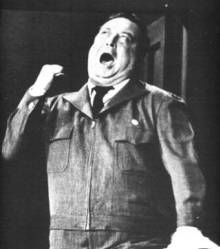
Gottlieb's "notes" fail to give Nifong "evidence" of injuries "consistent with" the sort of violent gang rape he'd spun out before a ravenous media. Gottlieb's "notes" fail to give Nifong "evidence" of any individual having had adequate time, space and opportunity to commit the atrocious acts alleged. Gottlieb's "notes" fail to give Nifong plausible deniability of having had no credible identfication proof whatsoever upon which to indict when he settled on sending Seligmann, Finnerty and Evans before the grand jury. Gottlieb's "notes" fail, really, to give Nifong an iota of "evidence" that the events charged
might have happened.
Despite the incorrect, contrary conclusion spun by Duff, nothing "exposed" by him in this puff piece may be said to remotely approach "evidence of guilt beyond a reasonable doubt." Since nothing that had been publicly disclosed earlier had done so, either, but had, in fact, pointed mightily to a malicious travesty of justice being perpetrated by Durham's "minister of justice," I have faith in, and fully expect, Hon. W. Osmond Smith III to dismiss the charges against the Duke Three on or shortly after 22 September. No secret video tape. No self-incriminating statements. No "roll-over" teammates. No doctored defense photos.
Upon further review, we should thank Duff for this fine piece of investigative reporting. It proves that Nifong has nothing. Nothing, of course, but many more sleepless nights, the ruination of his career, the possible loss of his professional license, and multi-millions of dollars in judgments to be entered against him notwithstanding his ability, or not, to pay.

